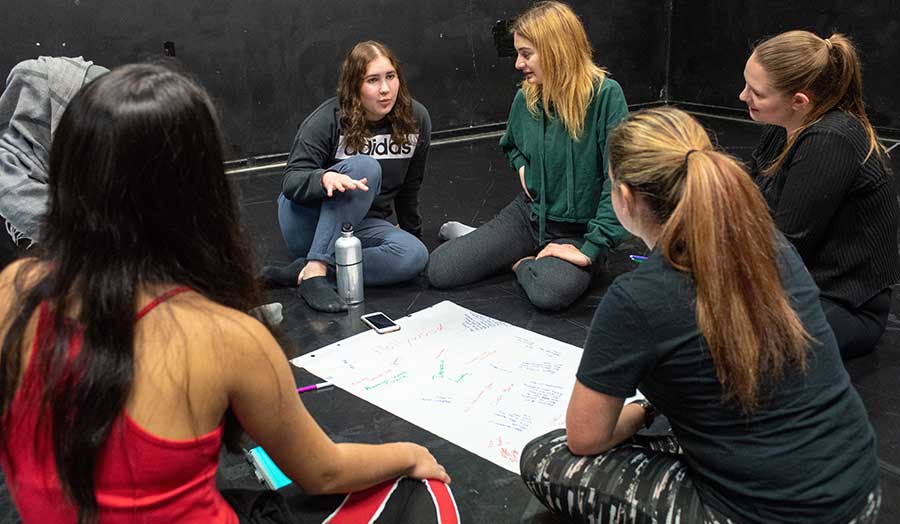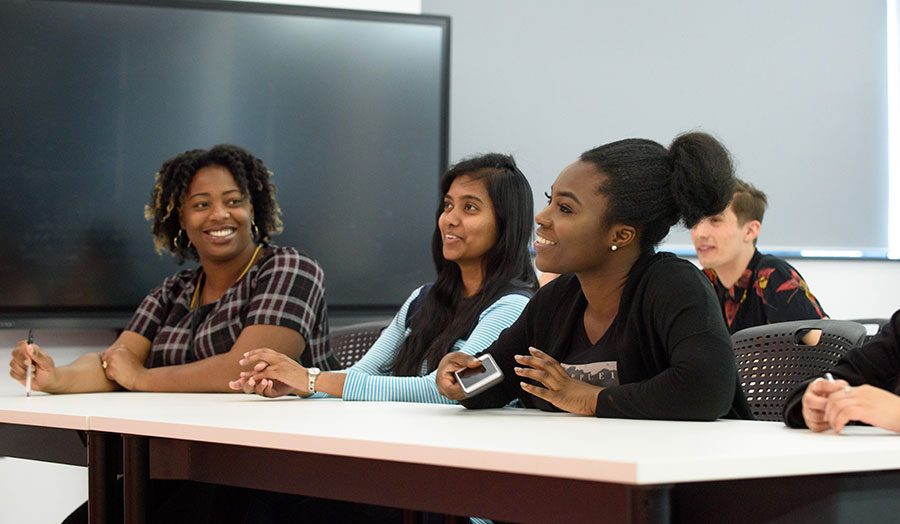

What to Include in Your PGCE Personal Statement
How your pgce personal statement should be structured, example personal statement, final thoughts, pgce personal statement.
Updated November 24, 2021

A PGCE personal statement is written as part of the application process for teacher training and gives candidates an opportunity to showcase their skills and attributes.
PGCE candidates will only write one personal statement, which is used to apply for all of their preferred choices. Students upload their personal statement to the UCAS Teacher Training system, and it is submitted for all choices in both phases of the application process (‘Apply 1’ and ‘Apply 2’). No changes can be made once it is submitted.
The personal statement is often used as the deciding factor for choosing whom to invite to interview . This piece of writing should explain the experience you have and how this translates into your abilities in the classroom.
It should also present what you might be like as a teacher – how will your personality and interests help engage students and get them enthused about the subject?
A lot is riding on your personal statement and writing it can be a daunting task. This guide will outline what your PGCE personal statement should contain and how to structure it for the best chance of success.
The admissions team will want to know about the skills, experience and personal qualities you have that would make you perfect for a teaching career. They need to see you have the dedication and passion to complete your PGCE and have a successful future.
Simply saying, “I would be good at this role and am well suited to it” isn’t enough. The PGCE provider needs to read real examples that demonstrate your skills and abilities and meet their requirements.

Here are some details you may want to include in your personal statement:
1. About You
A teacher’s personality and personal experience will be highly influential, therefore your own experiences are relevant to your application.
Before you start writing, it’s a good idea to spend a few minutes jotting down some key facts that are relevant to teaching. These might include:
- Your interests
- Qualifications/achievements
- What motivates you
- Your upbringing
- Relevant skills
Remember to include examples in your list. Coaching a sports team in your spare time suggests you are experienced in motivating young people and getting the best out of them. Maybe you play an instrument and use music in class. Including qualities like these will make your application stand out.
2. Why You Want to Teach
A key element of your application is explaining why you have chosen teaching as your future career. Show an awareness of how teachers can inspire individuals and also the benefits you might see in yourself.
Try to broaden your answer further than simply saying you are passionate about teaching or children. Every applicant will say they are passionate.
Give details of experiences that moved you towards this career or, perhaps, even the moment you realised this was what you were born to do. By using genuine examples, your passion and excitement will shine through.
3. Why You Are the Best Candidate
Try not to pull out a cliché like “I am passionate, dedicated and reliable” – make your application stand out by using a paragraph that the provider won’t see in any other application that day.
Think about what makes you different from any other candidate. Other applicants may say they can take charge of a class and have experience dealing with challenging children, but will they sing an entire lesson just to get the pupils to engage with them, like you did in your work experience? Or will they bring in a structure made out of Lego to demonstrate osmosis, like you did on your degree placement? Think of what makes you, you.
4. Why a PGCE?
Include details of why you have chosen to go down the route of a PGCE rather than doing a full teaching degree. Perhaps you dipped your toe into teaching while travelling after your degree and realised how much you love it, or maybe you are passionate about biology and wanted to decide at a later date whether to go into teaching or industry.
Show that you have done your research and understand the structure of the PGCE and what will be required.
5. Teaching-Related Experience
Include details of any experience you have gained working in schools or with children in another environment. This might include:
- Work experience
- Visits to schools
- Teaching assistant roles
- Voluntary teaching/supervision roles (like helping out at a scout hut, etc.)
- Experience via the Get School Experience service
- Classroom observations
With every experience you discuss, note the skills you gained and how they will benefit you as a teacher and how they have improved your understanding of the education system.
6. Other Professional Experience
Teaching demands a range of different skills – it’s not simply a case of delivering information.
Talk about past positions you have held:
- Did you manage people?
- Did you work within a team?
- Did you negotiate?
- Have you trained or coached others?
- When have you communicated information to different audiences?
The skills you have gained throughout your education, work and personal life can be highly relevant to your application. Be sure to include details of why these skills will make you excel as a teacher.
7. What You Learnt During Your Degree
Whether your degree was in the subject you intend to teach or not, it’s important to talk about the skills you developed throughout your learning and how they will benefit you as a teacher.
If you’re struggling to find transferable skills , here are some ideas:
- Think about how you communicated (presentations, critiquing the work of your peers, etc.)
- Give examples of how you organised yourself
- Describe times you helped others with their learning
Remember to talk about the benefits your initial degree will bring when studying for your PGCE and how your interest in it has inspired your desire to teach.
8. Your Knowledge of What Training to Be/Being a Teacher Entails
It’s important to stress your commitment to your training. To do this, you should demonstrate that you have done your research and are fully aware of what is to come.
Although teaching is a highly rewarding career, no one applying for teacher training will do so without being aware of the challenging nature of the profession.
There is no need to ignore these challenges in your application; actually, it will work in your favour if you show that you have thought about these challenges and are sufficiently prepared.
Talk about the positives and negatives that you expect to experience in your training and within your career, and how your core strengths will help you deal with them.
9. Your Future Plans
Discuss your plans beyond the PGCE:
- Do you have the ambition to be a headteacher?
- Do you plan to take on pastoral responsibilities?
Show a keenness to immerse yourself in the school system and be open to opportunities that come your way.
10. Extenuating Circumstances
Your personal statement is the place to openly discuss any extenuating circumstances, such as low grades or large gaps in employment/education. Make sure you show how you have overcome these challenges and what you learnt from them.

Write your personal statement in Word (or equivalent) and make sure you are happy with it before copying and pasting it into your application on the UCAS system.
You need to keep your personal statement to no more than 4,000 characters across a maximum of 47 lines of text . The UCAS Teacher Training system may differ slightly to your word processor, so be prepared to amend slightly once you have copied it into the UCAS page.
To keep to the character limit and cover all the suggested material above, you will need to be succinct. Make sure you only talk about topics that are relevant and delete any waffle.
Your opening statement should be strong and memorable – a good idea is to state why you have decided to get into teaching. Back up all details with examples and be sure to say what you learned from the experience or how you can bring the skills you developed into the classroom.
Split your statement into three sections:
- Introduction – Introduce yourself and talk about why you want to do a PGCE
- Middle – Use the notes above to cover the key details
- Conclusion – Tell the reader why you are the best person for the place they are offering
Avoid using bold, underlining or italics, and write in English (or Welsh if applying for Welsh PGCEs). The UCAS system will strip all special formatting out of the personal statement (except paragraph breaks) so ensure you keep it simple.
When you are happy with the content, make sure you ask someone to check your work . Spelling and grammar in personal statements should be accurate. Make sure you have not copied anyone else’s work at all – UCAS screens all applications for plagiarism.
Below is an example personal statement which covers all of the key points you should include in this piece of writing:
A teacher at my secondary school single-handedly transformed my passion and ability for maths; I was predicted an ‘F’ at GCSE and in a matter of months, she helped me achieve a ‘B’ and start to enjoy the subject. I can’t think of a more satisfying job than one in which you can inspire young people in the way my teacher inspired me. After achieving a ‘B’ in maths at A-Level, I went on to study the subject at University College London and graduated in 2018 with a 2.1. It was in the final year of my degree that I had my first taste of teaching the subject, as several of the modules involved presenting topics to large groups of first-year students. I was thrilled when students asked to see me afterwards to share their observations of what I had been discussing – it was clear my enthusiasm had rubbed off on them and they were excited by maths, which is exactly why I want to teach. I currently work as a teaching assistant at St Andrew’s School, where I have been for six months. This position has given me a great insight into the skills needed to be a fantastic teacher; the school has several SEN pupils and I have been exposed to the more challenging side of the profession. Being trusted to run activities with the entire class has helped me build confidence and learn how important it is to adapt lesson plans to engage students who have different abilities. I have gained valuable skills in implementing strategies such as gentle competitiveness between pupils, and tactical seating plans to get the best out of each student. Before working at St Andrew’s, I completed a work experience placement at Bell Lane Academy where I shadowed teachers working across the five different year groups. This experience helped hone my skills in addressing different age groups in different ways. My ability to get the best out of students is further strengthened by the experience I am currently gaining in the position of assistant coach at my local netball team. Having worked with the girls for the last 18 months, I have developed different ways of motivating individuals, helping push them outside of their comfort zones and encouraging them to take on new challenges. In my spare time, I enjoy playing netball and rugby and would be keen to take on extra responsibilities at a school in the form of after school clubs or teams. I also have a keen interest in management styles and personality types. The knowledge I gain from books on these topics helps me understand pupils and their differing learning styles – what works for them and what doesn’t. It also helps me look inwardly, analysing my own leadership style and methods of teaching. I have chosen to do a PGCE because I am passionate about maths, and I wanted to spend three years of a degree course exploring the subject further, rather than embarking on teacher training straight from school. My degree course has helped me with my confidence and my ability to speak in front of large groups of people. Teaching first-year students during my degree course helped me think about how to deliver the subject in an exciting and creative way. The experience I have had so far has clearly shown that teaching is an extremely challenging profession, but one which I believe is undeniably my calling in life. I adore maths and I want to bring the subject alive, helping children learn in an exciting, rewarding environment. A few weeks ago, I took it upon myself to ask the headteacher for permission to get the whole year group involved in a human percentages exercise – the children loved it. I believe I should be offered a place on your PGCE programme because I can commit to dedicating myself to a role in which I will strive to inspire and excite every pupil I teach.
The personal statement is your one opportunity to capture the attention of the PGCE provider and set yourself apart from other candidates. Teaching is about bringing your personality into the classroom and inspiring students, so avoid a formulaic application and speak from the heart, giving a full picture of who you are.
Your answers should convey enthusiasm for inspiring young people, a passion for teaching, creativity, excellent organisational skills and energy.
Demonstrate an awareness of this challenging profession but conclude with excitement and enthusiasm for your chosen career path.
You might also be interested in these other Wikijob articles:

Or explore the Postgraduate / Further Study sections.
Suggestions in Courses
Suggestions in news.
- No suggestions found.
Suggestions in Events
Writing a pgce personal statement.
If you’re applying to train as a teacher you’ll be required to write a personal statement as part of your application.
Take your time writing your personal statement. It’s your first chance to make a good impression so it's well worth investing time to develop a clear structure and style of writing.
It’s a good idea to proofread your statement thoroughly and get others to read through and check for typos, grammatical errors, style, and tone.
What's the personal statement for?
The personal statement is crucial to your PGCE application; it is used primarily to decide whether to invite you for an interview. A poorly written personal statement could end your teaching career before it has started!
This is your chance to demonstrate what you have to offer as a teacher. You should also explain why you want to teach a particular subject or age range, and how your skills and experience will help you become a great teacher. It’s your chance to show your motivation, commitment and teaching potential and an opportunity to show your enthusiasm for teaching a particular subject or age group.
Remember, you only get one opportunity to write a personal statement for both cycles of applications, so it’s important to keep in mind that you should avoid creating tailored personal statements for each university.
How to write and structure your personal statement
The personal statement is split into two sections totalling a maximum of 1,000 words. It’s important to make sure you do not repeat yourself and to take time to ensure that each section is organised coherently. Divide your writing into paragraphs, each dealing with a particular aspect of the question.
Section 1: Why do you want to teach?
(Up to 600 words).
This is the place to talk about why you think you would make a great teacher. You can include:
- what has led you to choose teacher training
- your understanding of the demands and rewards of the PGCE course and of the teaching profession
- the personal qualities that will make you a valuable asset to a school
- details of any paid or unpaid experience you have of working with young people and what you learnt
- details of any other experiences which you can bring to the teaching profession. Think about any ‘transferable skills’ or qualities which you have developed which may be relevant to teaching.
- If you are a career-changer, what have you been doing and what are your reasons for the switch to teaching?
- your thoughts on children’s wellbeing and the education system
Your personal statement should tell us why you want to teach, your skills and about any experience you might have of working with young people or in the education sector. If you are taking any exams or additional study before starting the course, particularly if this relates to your eligibility to join the course, we want to hear about it.
It should also show that you understand the education system, what challenges teachers face and that you’re engaged with issues around education.
If you’ve not taught before, think about any other things you’ve done that might demonstrate the skills you’ll need to be a teacher (your transferable skills).
Although it’s a good place to expand on your skills and experience, this shouldn’t be the main focus of your personal statement as the rest of the application will showcase this.
Section 2: Why are you suited to teach your subjects or age group?
Up to 400 words.
Remember to not repeat anything you have already said in section 1!
If you’re writing a personal statement for secondary teacher training, use this section to describe your knowledge and experience of the subjects you’ve chosen. Any work experience in the field will be of interest.
What universities are looking for
Universities want to see your passion for teaching and understand why you think teaching this subject or age group is the right career for you.
Your personal statement should be original and honest. Try and avoid clichés or writing what you think we want to hear. All we really want to hear are the real reasons you’re applying to study a PGCE and become a teacher.
If you’re writing a personal statement for primary teacher training, say why you’d like to teach this age group. If you are particularly interested in certain primary subjects or have relevant experience in them, you can talk about that here too.
You could talk about:
- any relevant work or unpaid experience
- your degree and degree modules
- your other relevant qualifications, such as A levels
- any relevant skills, interests or achievements
- your understanding of the national curriculum
Questions your personal statement should answer
- Why do you want to be a teacher?
- Why do you want to teach a particular subject, Key Stage or age group?
- What are your strengths?
- What experience do you have and how has this influenced your desire to teach?
- What skills do you have that would be useful for teaching
The finer details
Your personal statement should be:
- no more than 1000 words
- written in the first-person
- grammatically correct - we suggest writing in a document before adding to your application
- your own work, don’t copy from anywhere online
- structured correctly with a clear introduction, evidenced paragraphs and a conclusion
- proof-read before being submitted
And finally, be prepared to answer questions about what you’ve written in your personal statement at the interview stage!
Find out more about how to get into teaching .
.jpg)
Find out more about how to get into teaching .
Follow us on social!
Facebook Instagram LinkedIn Twitter YouTube
Study a PGCE at London Met

PGCE Primary (3-7) - PGCE
Study this PGCE Primary course and become a qualified teacher of three to seven-year-olds.

PGCE Primary (5-11) - PGCE
Train to teach five to 11-year-olds on this PGCE course that leads to Qualified Teacher Status (QTS).

PGCE Secondary Computer Science with ICT - PGCE
Train to teach Computer Science with ICT to 11 to 16-year-olds and, by arrangement, 16 to 18-year-olds.

PGCE Secondary Computer Science with Maths - PGCE
This London Met Computer Science with Mathematics PGCE is a great option for those who want to combine both disciplines into their PGCE. Apply now.

PGCE Secondary English with Drama - PGCE
This course will train you to teach English and Drama to 11 to 16-year-olds and, by arrangement, 16 to 18-year-olds.

PGCE Secondary English with Media - PGCE
Train to teach English and media to 11 to 16-year-olds and, by arrangement, 16 to 18-year-olds.

PGCE Secondary Mathematics - PGCE
Train to teach maths to 11 to 16-year-olds and, by arrangement, 16 to 18-year-olds. This course leads to Qualified Teacher Status (QTS).

PGCE Secondary Modern Languages - PGCE
Train to teach modern languages to 11 to 16-year-olds and, by arrangement, 16 to 18-year-olds with our PGCE course that leads to Qualified Teacher Status (QTS).

PGCE Secondary Science with Biology - PGCE
Train to teach science and biology to 11 to 16-year-olds and, by arrangement, 16 to 18-year-olds on this PGCE course that leads to Qualified Teacher Status (QTS).
PGCE Secondary Science with Chemistry - PGCE
Train to teach science and chemistry to 11 to 16-year-olds and, by arrangement, 16 to 18-year-olds. This PGCE course leads to Qualified Teacher Status (QTS).

PGCE Secondary Science with Physics - PGCE
Train to teach science and physics to 11 to 16-year-olds and, by arrangement, 16 to 18-year-olds on our PGCE course that leads to Qualified Teacher Status (QTS).
-(1).jpg)
Primary (7-11) (Key Stage 2) - PGCE
Train to teach seven to 11-year-olds on our specialist Key Stage 2 course, with Qualified Teacher Status (QTS).
More articles like this...
Checking your eligibility to study a pgce, how to prepare for your teacher training application, how to write a good personal statement for pgce application, what to expect at your pgce interview.
- How to write a teacher training personal statement

Teacher Training
- Routes into teaching in England
- PGCE university-led teacher training in England
- School Direct (tuition fee) programmes in England
- School Direct (salaried) programmes in England
- Postgraduate Teaching Apprenticeship programmes in England
- Teach First Leadership Development Programme
- Assessment Only programmes in England
- Researchers in Schools, including Maths and Physics Chairs programme
- Postgraduate Early Years Initial Teacher Training in England
- Find teacher training programmes
- Train to teach in Northern Ireland
- Explore your options in Scotland
- How to apply for teacher training in Scotland
- Scotland and Wales: What happens next?
- Fees and funding
- Returning to teaching
- Decisions and replies
- Know your rights!
- Preparing for interviews
- Preparing for teacher training
Tips for your teacher training application
Tips for your teaching training application.
If you're looking for programmes in England , use the DfE's ' Apply for teacher training' service . If you're looking for programmes in Wales or Scotland, use UCAS' search tool .
You can only complete one personal statement You can’t change it or create different ones for university or school-based choices. The providers you’re applying to understand this, so they won’t be expecting you to say specific things about them or their programmes. However, if you’re applying for programmes in a particular subject or age group, it would be helpful to explain why you have chosen them, and the skills and attributes you have that make them appropriate for you.
I read hundreds of UCAS applications for teacher training every year, and I cannot stress how important the personal statement is. Claire Harnden, Director of Initial Teacher Training at Surrey South Farnham SCITT
What to include
You do need to think carefully about the things that all your chosen providers will want to know about you. You’ll probably want to include things like:
- your reason(s) for wanting to teach
- evidence that you understand the rewards and challenges of teaching
- details of your previous education and how you have benefitted from it
- any other work with young people, such as helping with a youth club, working at a summer camp or running a sports team
- the range of relevant abilities and skills you can bring to teaching, for example, practical experience, managing people, working with or leading a team, and communication skills
- any reasons why there may be restrictions on your geographical mobility
- why you want to study in the UK, if you don’t currently live here
- whether you have any previous classroom experience, either independently or had a taste of school life via the Get School Experience service .
These are the things all training providers want to know – whether they’re School Direct, a university or a SCITT – so there’s no need to worry that you can’t write different personal statements. Read what SCITT director, Claire Harnden, looks for in a teacher training personal statement .
In addition to the details you give in the school and work experience section, you can also expand on your experience of teaching, such as visits to schools, classroom observations or working as a teaching assistant. To help, read Chris Chivers' tips for completing your teacher training application .
Whatever the route, the process will have similar elements, which are worth considering, so that the appliation has the greatest chance of making an impression. Chris Chivers, experienced ITT tutor and mentor
How to write it
You can use up to 47 lines of text (4,000 characters) in your personal statement. Some word processing packages calculate line counts differently from the UCAS Teacher Training system, so you might need to redraft your statement if there’s a discrepancy between the counts.
- Write in English (or Welsh if you’re applying to Welsh providers) and avoid italics, bold or underlining.
- Get the grammar and punctuation right and redraft your statement until you’re happy with it.
- It’s a good idea to write your personal statement in a word processor first, then copy and paste it into your application.
Don’t copy!
Don’t copy anyone else’s personal statement or from statements posted on the internet. Make sure your personal statement is all your own work.
You might also like to read
Ucas teacher training in england: what happens next, sponsored articles ucas media service, teacher training: three things to consider before you apply, how to prepare for your teacher training interview, five reasons to sign up to the ucas newsletter.
Our cookies
We use cookies for three reasons: to give you the best experience on PGS, to make sure the PGS ads you see on other sites are relevant , and to measure website usage. Some of these cookies are necessary to help the site work properly and can’t be switched off. Cookies also support us to provide our services for free, and by click on “Accept” below, you are agreeing to our use of cookies .You can manage your preferences now or at any time.
Privacy overview
We use cookies, which are small text files placed on your computer, to allow the site to work for you, improve your user experience, to provide us with information about how our site is used, and to deliver personalised ads which help fund our work and deliver our service to you for free.
The information does not usually directly identify you, but it can give you a more personalised web experience.
You can accept all, or else manage cookies individually. However, blocking some types of cookies may affect your experience of the site and the services we are able to offer.
You can change your cookies preference at any time by visiting our Cookies Notice page. Please remember to clear your browsing data and cookies when you change your cookies preferences. This will remove all cookies previously placed on your browser.
For more detailed information about the cookies we use, or how to clear your browser cookies data see our Cookies Notice
Manage consent preferences
Strictly necessary cookies
These cookies are necessary for the website to function and cannot be switched off in our systems.
They are essential for you to browse the website and use its features.
You can set your browser to block or alert you about these cookies, but some parts of the site will not then work. We can’t identify you from these cookies.
Functional cookies
These help us personalise our sites for you by remembering your preferences and settings. They may be set by us or by third party providers, whose services we have added to our pages. If you do not allow these cookies, then these services may not function properly.
Performance cookies
These cookies allow us to count visits and see where our traffic comes from, so we can measure and improve the performance of our site. They help us to know which pages are popular and see how visitors move around the site. The cookies cannot directly identify any individual users.
If you do not allow these cookies we will not know when you have visited our site and will not be able to improve its performance for you.
Marketing cookies
These cookies may be set through our site by social media services or our advertising partners. Social media cookies enable you to share our content with your friends and networks. They can track your browser across other sites and build up a profile of your interests. If you do not allow these cookies you may not be able to see or use the content sharing tools.
Advertising cookies may be used to build a profile of your interests and show you relevant adverts on other sites. They do not store directly personal information, but work by uniquely identifying your browser and internet device. If you do not allow these cookies, you will still see ads, but they won’t be tailored to your interests.
How to write a PGCE personal statement
29 th September 2021

- Post on Facebook
- Send to a friend
- Recommend 0
Advice on how to write a PGCE personal statement that shows you’d make a great addition to a teacher training course.
What is a teacher training personal statement?
What to write, pgce personal statement tips.
When applying for a PGCE or postgraduate teacher training, you’ll probably have to write a personal statement. This is your chance to say why you’d make a great teacher by highlighting your relevant experiences and passion for teaching.
If you’re applying directly to a university or school, you should tailor your statement precisely to the course you’re applying for.
If you’re applying through UCAS Teacher Training, you can send your application to more than one university. Therefore, your statement should be more generic so that it applies to each one you’re applying to.
In both cases, make sure that your personal statement reflects the nature of the course or courses you’re applying for. Think about, for example, is it school- or university-based training? What age of students will you be teaching? Will you be specialising in a particular subject?
Before you start writing, look at any information you can find about the course and what you must do to apply. Has the university provided any guidance or topics of what you need to cover?
If not, can you speak to one of the course tutors to discuss what they might want to see in your statement? Or can you talk to a current PGCE student and ask what they wrote in theirs?
When you have a good idea of what admissions tutors will be looking for, create a mind map or list:
- Your relevant academic and practical experiences
- Areas of the course that you’re most interested in
- Anything else the university wants you to include
When structuring your statement, you can use your mind map or list to plan what information to put where.
Your structure can look something like:
- Introduction – about yourself and why you want to do the PGCE
- Middle paragraphs – relevant information of your academic achievements and experiences of working within education
- Concluding paragraph – tying up the main points of why you’re the best candidate for the course
If you’re applying directly to the university, check what the word limit for your personal statement is.
If you’re submitting to UCAS Teacher Training, your personal statement can be up to 47 lines of text or 4,000 characters.
Expanding on your mind map or list from before, think in more depth about why you want to teach.
- What qualities do you have that would make you good at teaching?
- What do you think are the challenges and benefits of being a teacher?
- Why have you chosen this particular age group and/or subject?
- What have you learned from your previous experiences in education?
- Will you be completing any extra exams or relevant experiences before the course starts?
If you studied education at undergraduate level, your course was probably focused on the theoretical side of the subject. Your PGCE course, however, will be about applying those theories to real-life situations in schools. Your personal statement should reflect your understanding of this.
If you haven’t taught before, what other activities or events in your life suggest that you would make a good teacher? Have you worked with children in different environments?
Admissions tutors don’t just want to see why you think your experiences make you a good teacher. Instead, they want to know that you’re aware of the importance of teaching and the demands that come with it.
- Why is it important to reflect on your abilities as a teaching practitioner?
- How will you work on your own development to become a great teacher?
- What interests you about the education system and its challenges?
- Do you have any thoughts are on child welfare and social justice?
When writing, make sure to use evidence and examples to back up your points. Through your tone of voice, try to show that you are positive and passionate about the work.
To see more information on how to style your personal statement, see our postgraduate statements guide.
- Ask someone you know to check it through. Even better if you can get feedback from a teacher
- See if you can speak to other students applying for a PGCE to share thoughts and ideas of what to write
- Similarly, reach out to PGCE staff at your university – or a teacher you know – they have experience that might be valuable to you!
- Any time you can spend in a school will be a valuable addition to your application. If you haven’t already, see if you can arrange to volunteer with one locally
- If you’re invited to an interview, you’ll be asked about what you’ve written on your statement, so be prepared to talk about it in more detail
DON'T MISS OUT
Receive regular newsletters packed with useful tips.
Best Universities for Medicine
It is no surprise that medicine is a popular subject for study at university – many...
Converting a Postgraduate Certificate to a Masters
PG certificates are a perfect stepping stone to a Masters degree as you’ll not only...
Law and Legal Studies - Postgraduate Guide
As it is a subject that touches many other sectors, there are various postgraduate...
Similar articles and videos
Best universities for business studies, best universities for aeronautical and aerospace engineering, best universities for chemistry, best universities for sports science, don't miss out.
- Sign up for emails
- Find an event
- Pay and benefits
- Changing careers
- Who to teach
- What to teach
- View all in Life as a teacher
- Postgraduate teacher training
- Qualifications
- Other routes into teaching
- View all in Train to be a teacher
- Courses with fees
- Courses with a salary
- Extra support
- View all in Fund your training
- Teacher training application
- Teacher training personal statement
- Teacher training references
- When to apply for teacher training
- Teacher training interviews
- Subject knowledge enhancement (SKE)
- If your application is unsuccessful
- View all in How to apply
- If you want to train to teach
- If you're already a teacher
- Get international qualified teacher status (iQTS)
- If you're from Ukraine
- View all in Non-UK citizens
- How do I change to a career in teaching?
- Which age group should I teach?
- How can I teach children with special educational needs?
- If you have or are studying for a degree
- How to choose your course
- What to expect in teacher training
- Get school experience
- Teaching internships
- Qualifications you need to be a teacher
- Qualified teacher status (QTS)
- Postgraduate certificate in education (PGCE)
- If you do not have a degree
- If you’ve worked as an unqualified teacher
- If you want to do a teaching apprenticeship
- Tuition fees
- Student finance for teacher training
- Bursaries and scholarships
- Salaried teacher training
- Funding and support if you're disabled
- Funding and support if you're a parent or carer
- Funding and support if you're a veteran
- Train to teach in England as a non-UK citizen
- Fees and financial support for non-UK trainee teachers
- Qualifications you'll need to train to teach in England
- Apply for your visa to train to teach
- Teach in England as a non-UK qualified teacher
- Get an international relocation payment
- Gain the equivalent of English QTS, from outside the UK
- Ukrainian teachers and trainees coming to the UK
Your teacher training personal statement
Your personal statement is your chance to make yourself memorable with teacher training providers and show them why you’ll make a great teacher.
You do not have to write it all at once – you can start it and come back to it. Successful candidates often take a few weeks to write their personal statements.
How long should my teacher training personal statement be?
Your personal statement can be up to 1000 words. 90% of successful candidates write 500 words or more.
You could include:
- skills you have that are relevant to teaching
- any experience of working with young people
- your understanding of why teaching is important
- your reasons for wanting to train to be a teacher
- any activities you’ve done that could be relevant to teaching (such as first aid courses, sports coaching or volunteering)
Teacher training providers want to see your passion and that you understand the bigger picture of teaching.
How to write your personal statement
When writing your personal statement you should make sure you check your spelling and grammar in your application. You want to make the best possible impression.
You can use ChatGPT or other artificial intelligence (AI) tools to help you write your personal statement. You should not rely on it to write your entire statement because:
AI tools use bland language and will not be able to give details about you as a person. Using them may result in your application being unsuccessful
your account to apply for teacher training may be blocked if you consistently submit personal statements that look like they have been written with AI tools
Do I use the same personal statement for each application?
You can use the same personal statement for every course you apply to.
However, there may be some instances where you’d like to tailor it to different courses.
For example, if you want to apply to train to teach maths and also to train to teach physics. In this case, you might want to change your personal statement to talk more specifically about the subject you’re applying to train to teach.
Should my personal statement be different if I’m training to teach primary or secondary?
You should use your personal statement to explain why you feel passionate about teaching a specific age range or subject.
If you’re applying for a primary course with a subject specialism, or you’re particularly interested in certain primary subjects, you can talk about that, too.
If you’re not sure if you want to teach primary or secondary, you can find out more about teaching different age groups .
Do I need school experience?
You do not need school experience to apply for teacher training, but it can help strengthen your personal statement.
Teacher training providers like to see that you have a good understanding of teaching, how the school system works and what your transferable skills are. You need more than just good subject knowledge and school experience can be a great way to get this.
Getting some school experience can also be a good way to make sure teaching is right for you before you apply for a course.
Find out how you could get school experience .
Get help with your personal statement
You can get help with your personal statement from our teacher training advisers . They have years of teaching experience and can give you free, one-to-one support by phone, text, or email.
Advisers can also help you understand more about what teaching is really like, which can help improve your application.
Having a teacher training adviser was really beneficial when editing my personal statement and preparing for interviews. My top tips for the application process would be to get an adviser, and to think about what transferrable skills you have when writing your personal statement and answering interview questions. Felix, former teacher trainee
Start your application
Create an account and start your application for a teacher training course.
Apply for a course
Get free one-to-one support
Maximise your chances of submitting a successful application with the support of a dedicated adviser with years of teaching experience. Chat to an adviser through phone, text or email.
Chat online
Chat is closed
Chat not available Email: [email protected]
0800 389 2500
Call or chat to us Monday to Friday, 8:30am until 5:30pm , except on bank holidays (opens in new window) .
Whether it's just an idea or you're ready to apply, you could get personalised support from an adviser with years of teaching experience. Chat to them by phone, email or text as little or as often as you need.
We use cookies to collect information about how you use this website. We use this information to make the website work as well as possible, and improve this website. We also share some of this information with our social media, advertising and analytics partners.
- Log in
- Site search
Teaching personal statement examples
Giving you the chance to show why you'd be a great teacher, your personal statement is an important part of your application and worth taking the time over
What is a teaching personal statement?
Your personal statement is used to explain why you want to become a teacher and your suitability for the role. While your application form briefly outlines your qualifications, skills and work experience, your teaching personal statement is where your personality shines through.
Take your time with it. Many candidates often spend a few weeks on this part of the application as you don't have to write it all at once. You should get someone to read over it and be prepared to receive constructive feedback and write a few drafts before you send it off.
It's important to:
- use examples based on your recent teaching experience
- tailor your personal statement according to the school/age group
- use good, clear, written English, using first person terms such as 'my' and 'I'
- be original and honest
- avoid clichés and general statements, such as 'I've always wanted to teach'
- demonstrate a passion for teaching.
While it's crucial to get it right, your teaching personal statement is only a small part of the application process. Find out how else you'll need to prepare to get a teaching job .
How to write a personal statement for teaching
Your personal statement should be between 500 and 1,000 words. It's crucial that you don't copy and that the statement you provide is your own work .
This is your opportunity to:
- write about any relevant skills and experience you have
- explain your understanding of why teaching is important
- detail why you want to become a teacher
- list any extra skills or experience you have, such as volunteering or first aid.
See personal statements for postgraduate applications for more guidance.
The nature of your personal statement will vary, depending on the type of teaching you'd like to pursue. Take a look at some of our example personal statements to get an idea of how they differ.
Personal statement for PGCE primary
As well as focusing on roles in which you've gained experience with primary-age children, a PGCE primary personal statement should demonstrate your well-rounded personality and any skills that could be useful for the range of extra-curricular activities primary schools provide (such as the ability to read music for recorder lessons, or drama experience to help with school plays).
Personal statement for PGCE secondary
Many good PGCE secondary personal statements acknowledge the challenges involved in teaching older pupils and provide examples of where the candidate has worked to overcome these problems. As secondary teaching roles are geared towards teaching a specific subject, training providers are looking for more evidence of your subject and degree knowledge.
Personal statement for School Direct
If you're applying for the salaried School Direct route, you should discuss the experience you've gained in the classroom prior to your application. One of your references will need to be from an employer, or someone who can comment on your work ethic and suitability for teaching. Don't worry if your degree is unrelated to the subject you'd like to teach - you may still be able to apply by completing a subject knowledge enhancement (SKE) course .
Find out more
- Discover how to structure a teaching CV .
- Find out what it's really like to be a primary or secondary school teacher .
- Search postgraduate courses in teaching .
How would you rate this page?
On a scale where 1 is dislike and 5 is like
- Dislike 1 unhappy-very
- Like 5 happy-very
Thank you for rating the page

- Careers Service
- Which career
- Jobs / experience
- Applications / interviews
- International
- CareerConnect
- Applications for further study
- Personal statement for teaching
- UCAS personal statement for medicine
Writing a personal statement for teacher training
These guidelines apply to applications for a PGCE or Schools Direct which are both made through Apply on the .Gov website
Include the following:
- Your reasons for teaching: Avoid clichés like, "I've always wanted to be a teacher".
- Choice of programme: Demonstrate that you have made a well-researched and informed choice. Show your knowledge of Initial Teacher Training providers.
- Knowledge and commitment to the age range you are applying for: If you are applying for both primary and secondary places in the same application, you need to make a strong case for your preferred option.
- Subject specific commitment: Subject tutors read the forms, so if you are applying for secondary it is important to mention this.
- Enthusiasm: Selectors look for clear-headed, informed enthusiasm. You need to demonstrate you understand the demands of the profession. Why would you be a good teacher?
- the national curriculum, national strategies and subject organisations eg The Association of Science Education
- classroom management (behaviour, groups, resources, timing and pastoral care)
- teachers roles and responsibilities
- classroom organisation
- differentiation- special education needs (SEN)
- the role of ICT
- assessment for learning
- awareness of possible gaps - eg if you have a C grade in English and are applying for primary, you need to show that you are willing to polish up
- Mention any geographical restrictions you have, as these may be taken into account.
- Get advice on your personal statement
- Information on routes into teaching
Further advice
- From the Department for Education
- Target Jobs advice on writing your personal statement
- Getting in touch
Careers Service, The University of Manchester
Connect with us
- Copyright notice
- Accessibility
- Freedom of information
- Charitable status
- Royal charter number: RC000797

IMAGES
VIDEO
COMMENTS
Find out what is required for a PGCE personal statement and how to write one effectively, with 10 important tips. Use our examples to make it easy.
You can include: what has led you to choose teacher training. your understanding of the demands and rewards of the PGCE course and of the teaching profession. the personal qualities that will make you a valuable asset to a school. details of any paid or unpaid experience you have of working with young people and what you learnt.
The teacher training personal statement is your opportunity to let training providers know about your qualities, skills and expertise, and why you want to teach. Learn about what you need to include, how to write your statement and how to be unique.
When writing your personal statement, you need to include: What inspired you to choose teaching. Why you wish to teach at secondary level. Your knowledge of the pressures and rewards of teaching. The personal qualities and skills that will make you a good teacher.
When applying for a PGCE or postgraduate teacher training, you’ll probably have to write a personal statement. This is your chance to say why you’d make a great teacher by highlighting your relevant experiences and passion for teaching.
Clare talks to us about how to write a successful PGCE personal statement. The video will cover the process on applying, show two statement examples and prov...
You could include: skills you have that are relevant to teaching. any experience of working with young people. your understanding of why teaching is important. your reasons for wanting to train to...
5 Tips to help you write your PGCE personal statement. Professionalism and attention to detail are all skills that you can show off just by making your personal statement clean and tidy. Structure it with a clear introduction, main body and conclusion. Make sure that you leave plenty of time to proofread what you’ve written.
Your personal statement should be between 500 and 1,000 words. It's crucial that you don't copy and that the statement you provide is your own work. This is your opportunity to: write about any relevant skills and experience you have. explain your understanding of why teaching is important. detail why you want to become a teacher.
Include the following: Your reasons for teaching: Avoid clichés like, "I've always wanted to be a teacher". Choice of programme: Demonstrate that you have made a well-researched and informed choice. Show your knowledge of Initial Teacher Training providers.